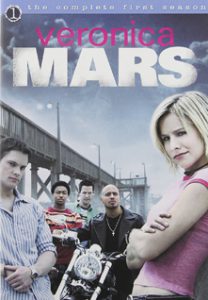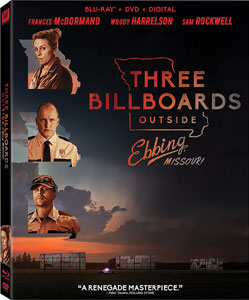“Three Billboards Outside Ebbing, Missouri” (2017) – which is still in many theaters and hits home video on Tuesday – is a brutal portrayal of the cycle of violence that exists beneath the veneer of what we call civilization. Writer-director Martin McDonagh takes humanity to task for what we’ve wrought, but also gives us enough dashes of love, decency and even humor to make “Three Billboards” a worthy Oscar contender despite being unsatisfying by traditional metrics.
Presumably set in the late 20th century in southern Missouri, the film starts like a whodunit might: The grieving and angry mother of a rape/murder victim, Mildred (“Fargo’s” Frances McDormand), rents three billboards with a message taking the Ebbing police to task for not making any arrests. Some might be disappointed that “Three Billboards” doesn’t proceed to be about the homicide case, but rather about the hopelessness of an unsolved crime with no leads.
When police chief Willoughby (Woody Harrelson, at his sardonic finest) stares at a blackened patch of grass – oh yeah, we’re told the girl was burned to death on top of being raped, if the on-screen violence isn’t nightmarish enough for you – the ground isn’t going to magically yield forensics evidence like it might in TV’s “Bellevue.”
You wouldn’t know it from TV and movies, but – as Willoughby regretfully points out — some crimes go unsolved; of course, there’s a reason why such stories are not made into pop entertainment. While McDonagh doesn’t find a juicy whodunit in this case, he does find a half-dozen delicious character arcs that serve to comment on the “Star Wars”-ian fear-anger-hate-suffering cycle and the foolishness of granting state agencies monopolies on legal violence.
Mildred is at the center of this mélange of anger. She lashes out at various collectives in the guise of individuals – including the poor local priest whom she holds personally responsible for the Catholic Church’s institutionalized altar-boy rapes.
But several others could be the fulcrum. Notably, police officer Dixon (Sam Rockwell) is a poster boy for what’s wrong with policing then and now: Low on IQ, high on rage, and usually drunk, he takes out his frustrations on innocents and faces much lesser consequences than a citizen would for the same actions. (Where a citizen would be unquestionably arrested and convicted, he is merely fired.) Most of Dixon’s scenes are tense, as we wait for him to explode.
In “Three Billboards,” though, “they’re not all bad,” as the popular apologetic goes. Although it’s hard to be critical of a grieving mother, it’s quickly apparent Mildred is wrong to rip Willoughby, a decent man – although he’s definitely too forgiving of Dixon’s brutality.
In a scene that illustrates “Three Billboards’ ” delicate knack for showing hints of decency, Willoughby and Mildred exchange barbs after Mildred is brought into the station for assaulting her dentist (albeit the creepiest dentist you’ve seen in a non-horror film). The back-and-forth is 50 percent for the fun of trading zingers, and 50 percent because they truly irk each other. Then Willoughby coughs up blood, a symptom of his pancreatic cancer, and tells Mildred he didn’t mean to; “I know, baby,” she says kindly, and goes to get help.

“Three Billboards” is not a film for those who want to see the main characters learn lessons and grow; these “adults” are too set in their ways. But it does provide an audience surrogate in Mildred’s teenage son Robbie (Lucas Hedges, who basically reprises his role from “Manchester by the Sea”).
Robbie learns about the adult world around him — not just a world where his sister is taken away for no reason, but one where his divorced mom and dad (John Hawkes) bicker at the drop of a hat. Like lightning, he’s at his father’s throat with a kitchen knife as soon as the ole domestic-violence habits kick in. It goes to show that children soak up knowledge like a sponge, and that includes awareness of evil.
Although a victim/activist buying billboards with hashtaggable messages smacks of a modern true story, it’s fictional, as is the town of Ebbing. Yet “Three Billboards” feels like an uncompromising chronicle of real people more so than a yarn. McDonagh’s late tonal shift away from hopelessness is barely there, and he withholds the tidy bow. Only a film this good could get away with that.

